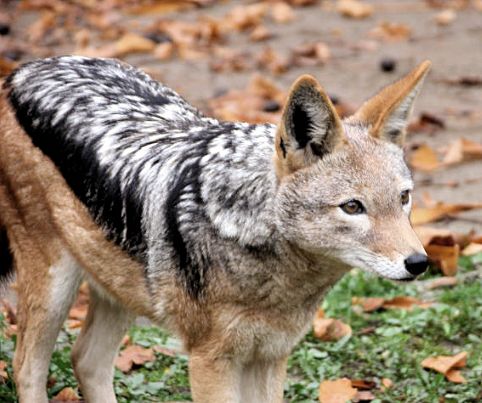|
FOXES >> Self-derived Prudence and Cunning
JACKALS >> Men who Herd Together for Plunder
 The Hebrew word used in the Bible for fox: The Hebrew word used in the Bible for fox:
. . . . undoubtedly includes the jackal as well. Indeed, in most of the passages where it occurs, the jackal, rather than the fox, is intended. . . . The two animals are commonly confounded, or spoken of together, by the natives of Syria, though they are perfectly aware of their distinctness. . . .
The character and habits of the eastern fox in no way differ from those so well known in other countries; but, from necessity probably, they are less exclusively carnivorous than in England. . . . The fondness of the fox for grapes is well known in the East; but not less so that of the jackal, which, going in packs, often commits great devastation in the vineyards. . . . One great difference between the jackal and the fox is that the former hunts in packs, while the latter prowls singly for his prey, which he takes by stratagem. (Tristram, in Natural History of the Bible)
The crafty, pilfering, cruel nature of the fox is made familiar by a thousand anecdotes to be found in every library. Mr. Wood gives the following account of his odor:
A very powerful scent is poured forth from the fox in consequence of some glands which are placed near the root of the tail, and furnish the odorous secretion. . . . It is by this scent that the hounds are able to follow the footsteps of a flying fox, and to run it down by their superior speed and endurance. The fox, indeed, seems to be aware that its pursuers are guided in their chase by this odor, and puts in practice every expedient that its fertile brain can produce in order to break the continuity of the scent, or to overpower it by the presence of other odors, which are more powerful, though not more agreeable. A hunted fox will make the most extraordinary leaps in order to break the line of scent, and throw the hounds on a false track. It will run for a considerable distance in a straight line, return upon its own track, and then make a powerful spring to one side, so as to induce the dogs to run forward while it quietly steals away. It will take every opportunity of perfuming, or rather of scenting, itself with any odorous substance with which it can meet, in the hope of making the hounds believe that they have mistaken their quarry. In fine, there are a thousand wiles which this crafty animal employs, and which are related by everyone who has watched a fox or hunted it. (Natural History)
 The jackal is an essentially nocturnal and gregarious animal. During the whole of the day the jackals lie concealed in their holes or hiding places, which are usually cavities in the rocks, in tombs or among ruins. At nightfall they issue from their dens, and form themselves into packs, often consisting of several hundred individuals, and prowl about in search of food. Carrion of various kinds forms their chief subsistence, and they perform in the country much the same task as is fulfilled by the dogs in the cities. If any animal should be killed, or even severely wounded, the jackals are sure to find it out and to devour it before the daybreak. (Bible Animals) The jackal is an essentially nocturnal and gregarious animal. During the whole of the day the jackals lie concealed in their holes or hiding places, which are usually cavities in the rocks, in tombs or among ruins. At nightfall they issue from their dens, and form themselves into packs, often consisting of several hundred individuals, and prowl about in search of food. Carrion of various kinds forms their chief subsistence, and they perform in the country much the same task as is fulfilled by the dogs in the cities. If any animal should be killed, or even severely wounded, the jackals are sure to find it out and to devour it before the daybreak. (Bible Animals)
The audacity of the jackal is as notable as his cunning. He will wait at the very door, biding his time patiently until it is opened and he may slink in through the aperture. Pigs, lambs, kids, and poultry fall victims to his insatiate appetite, and he has been known to steal the sleeping puppies from the side of their mother without detection. . . . Always ready to take advantage of every favorable opportunity, the jackal is a sad parasite, and hangs upon the skirts of the larger carnivores as they roam the country for prey, in the hope of securing some share of the creatures which they destroy or wound. . . . When the tiger has killed some large animal, such as a buffalo, which he cannot consume at one time, the jackals collect round the carcass at a respectful distance, and wait patiently until the tiger moves off and they can venture to approach. As soon as the tiger moves away, the jackals rush from all directions, carousing upon the slaughtered buffalo, and each anxious to eat as much as it can contain in the shortest time. (Natural History)
The common perception of men sees in the fox an emblem of craftiness, especially in getting possession of property. In Oriental stories, the jackal holds a similar place, as the representative of cunning and quick command of resources. In the fables of the East, animals are often put for human attributes, and are represented as speaking and carrying on the plot of the story with a sort of human intelligence. And among them the jackal is always the one to contrive plans, and to extricate the party from difficulties. But foxes and jackals are night animals; therefore the intelligence which they represent does not love spiritual light, but the light of the world, which by itself is spiritual obscurity. They are also cruel beasts of prey; which indicates that they represent selfish affections, which would prey upon others, and not do them good. They seem to be embodiments of sly, selfish artifice in obtaining property. Human foxes love tricky ways, and chuckle over the proceeds of some sharp maneuver, loving them more than any amount of honest gains.
The difference between the fox and the jackal seems to be that the jackal is more social, usually living in the neighborhood of others, and preying upon slain or wounded and feeble animals in company, while the fox is more solitary, more suspicious, more secret.
The men who herd together for plunder, taking advantage of troubled times, of the conflicts of greater men, and of everyone’s weakness or necessity, are jackals; but the slyer man, who lays his own plans in silence, trusts no one, and believes that he can outwit them all, is a fox. Mean thieves they all are; and I think there is an odor of meanness about them which is readily perceived, and which they cannot get rid of; but which the possessors try to obscure by an air of familiarity with worse wickedness which they assume to have met; thus, as it were, covering their own with a stronger scent. In every large community there must be many bone-strewn holes of foxes and jackals, which honest people seldom see until they fall into trouble.
Speaking spiritually, this enjoyment of one’s own tricky prudence, as a means of getting the better of others, is the opposite of a modest love of spiritual intelligence as a means of doing good. It is not pleasant to think of a perverted meaning to so good a fruit as grapes; but as wine can be used to produce drunkenness, so can grapes as food for foxes. In their right use they correspond to the pleasant truth of neighborly life, such as true charity loves; but foxes’ grapes are a knowledge of men and of the ways of life, as a means of getting selfish advantages. That pride in their own prudence such as foxes represent was common among the Jews, but that the truth of charity had no place in them, is meant by the Lord’s saying, “Foxes have holes, . . . but the Son of man hath not where to lay His head.”
The Lord also called Herod a fox; no doubt describing with perfect truth his essential character. The foxes with which Samson avenged himself upon the Philistines for taking his wife and giving her to his companion were probably jackals. ( Divine Providence #311; True Christian Religion 134. )
Three hundred of them Samson caught, “and took firebrands, and turned tail to tail, and put a firebrand in the midst between two tails. And when he had set the brands on fire, he let them go into the standing corn of the Philistines, and burnt up both the shocks, and also the standing corn, with the vineyards and olives.” Samson, as a Nazarite, represents the literal sense of the Word in power to expose and subdue evil. The Philistines represent those who allow themselves all pleasant evils of life, believing that they are saved by their faith. The Philistine bride of Samson represents a pretended affection for the genuine truth of the Word; her being given to another signifies that their pretended affection for truth is, after all, only for the means of confirming their falsity and excusing their evil; and Samson prophetically showed them that the natural consequence of their duplicity was the kindling of evil fires by which every good and true thing among them would be destroyed. In a like sense David says, “Those that seek my soul to destroy it, shall go into the lower parts of the earth. They shall fall by the sword; they shall be a portion for jackals” (Psalm 63:9, 10); referring literally to the clearing of a battlefield by the jackals; and spiritually to the utter destruction of those who hate the Lord and His truth, by their own perverse and deceitful reasonings.
Author: JOHN WORCESTER 1875
|
|